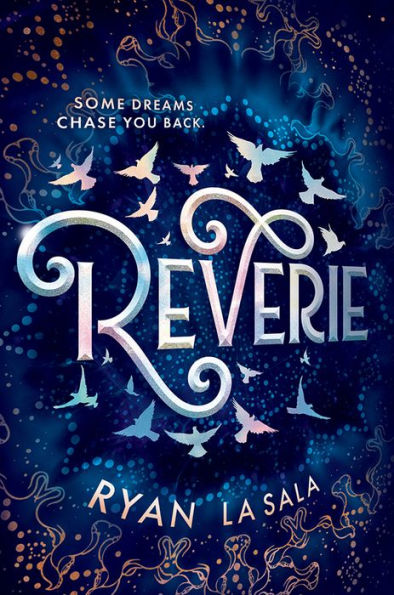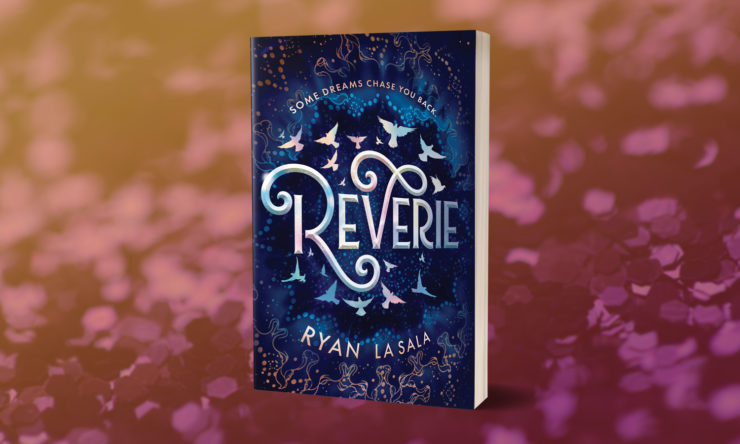Everything ended at the old mill. Or maybe it began there. Whatever happened, it left an old woman dead and Kane scarred and missing his memories. The police want to toss him in the slammer, his parents don’t trust him, his sister doesn’t believe him, and his classmates don’t care about him. He’s alone in the world, or so he thinks.
Suddenly Kane is thrust back into the life he can’t remember living. Something shadowy and sinister is stalking him, three teens claim to be his long lost besties, and a dynamic drag queen takes a keen interest in his personal life. The events at the mill fractured the group, and the Big Bad uses their interpersonal turmoil to make things worse, literally and magically.
There is so much to pick apart in Reverie, and all of it is wonderful. Much of the thrust of the plot comes from the reveries, spontaneously appearing pocket worlds born from a person’s vivid imagination, becoming more common and increasingly powerful. Kane and his newfound friends were once known as the Others, kids who somehow remain lucid while the rest of the world is sucked into the faux-reality of the reverie. Their lucidity grants them special powers they use to help the reverie resolve quickly and quietly: Elliot the illusionist, Ursula the warrior, Adelaide the memory eraser, and Kane the leader. While the reveries themselves are dense with tropes and pop culture throwbacks, Ryan La Sala twists and subverts them, harshly exposing the hopes and anxieties and fears and dreams of their creators.
Reverie is one of the queerest young adult fantasies I’ve ever read. It is unabashedly, gloriously, demandingly queer. The story goes beyond merely having characters canonically on the LGBTQIAP+ spectrum. Queerness permeates both the surface and the subtext. It’s how being the only out person in a sea of heterosexual and closeted people changes you for the better and the worse. It’s seeing queer characters in positions of power without feeling shame or attempting to assimilate into the majority. It’s finding your strength in who you are and embracing your truth even as it marks you as different.
Throughout the novel, Kane is constantly negotiating the demands of being the brave boy he was before the incident in the mill, the lonely boy he is now, the angry boy his former friends believe him to be, and the fighter Dr. Posey wants him to be. Yet he isn’t really any of those boys, or maybe he’s all of them and then some. The Others have undone Kane and the villain will remake him. Kane cannot win unless he finds the real version of himself, whoever that self may be. Easier said than done. Running from reality and hiding from the truth are tools of self-preservation in a world determined to crush the difference out of a person, and Kane is very good at both. The reveries have a “fear of being invaded, of being taken apart from the inside out,” but so does Kane. And like the reveries, he’ll lash out at everyone and everything attempting to carve out space in his heart in order to protect it from being broken.
Buy the Book


Reverie
Outed before he was ready, Kane has spent his teen years the target of bigots and bullies, so much so that his experiences have pushed other queer kids deeper into the closet. “Maybe a more astute child would have tried harder to rein themselves in, but Kane was the last to know he was gay and therefore powerless to deny it once he was finally told.” Because of this he “was marked. A curiosity placed in the limbo between the worlds of boys and girls.” Kane is trapped in his own personal hell as the only out kid at school, and as a result he’s become all sharp edges, biting sarcasm, and defense mechanisms.
La Sala repeatedly demonstrates how hard it is to push back against the dominant narrative (heteronormativity) to uncover the buried truth (queerness). Twice we encounter reveries where gay people are ostracized, despised, and executed. In another, the Others assume it’s a standard love triangle where two women are in love with the same man and only Kane recognizes it for the secret lesbian love affair it really is. The Others insist they’re the heroes who stop bad things from happening…except when you peel back all the layers you realize those “bad things” are just queer people trying to survive. The way Kane sees it, the heroes aren’t protecting the innocent but defending the homophobic status quo. He was an Other once; will he become one again or will he redefine the Others’ mission?
With a plot that veers between fast-paced and thoughtful and characters that are as enchanting as they are dangerous, Reverie is easy to fall in love with. La Sala is an exquisite wordsmith and he puts those talents on display as he crafts the intricacies of the reveries and the astonishment of the rainbow-colored magic battles. Reverie makes a strong, late-season case as one of the best young adult fantasies of the year. I can’t wait to see what Ryan La Sala writes next.
Reverie is available from Sourcebooks Fire.
Alex Brown is a teen services librarian by day, local historian by night, author and writer by passion, and an ace/aro Black woman all the time. Keep up with her on Twitter and Insta, or follow along with her reading adventures on her blog.










